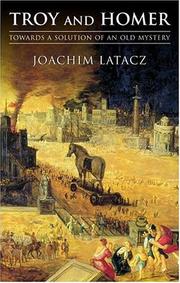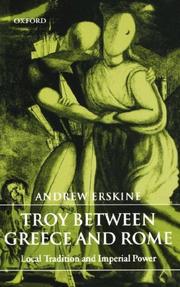| Listing 1 - 7 of 7 |
Sort by
|
Book
ISBN: 9780521762076 9781139028080 9781108446259 1108446256 0521762073 9781107505940 1107505941 1107501636 1139890107 1107500486 1107513642 1107496039 1107516366 1107503280 1139028081 Year: 2014 Publisher: Cambridge Cambridge University Press
Abstract | Keywords | Export | Availability | Bookmark
 Loading...
Loading...Choose an application
- Reference Manager
- EndNote
- RefWorks (Direct export to RefWorks)
The Archaeology of Greek and Roman Troy provides an overview of all excavations that have been conducted at Troy, from the nineteenth century through the latest discoveries between 1988 and the present. Charles Brian Rose traces the social and economic development of the city and related sites in the Troad, as well as the development of its civic and religious centers from the Bronze Age through the early Christian period, with a focus on the settlements of Greek and Roman date. Along the way, he reconsiders the circumstances of the Trojan War and chronicles Troy's gradual development into a Homeric tourist destination and the adoption of Trojan ancestry by most nation-states in medieval Europe.
Excavations (Archaeology) --- Fouilles (Archéologie) --- Troy (Extinct city) --- Turkey --- Troie (Ville ancienne) --- Turquie --- Antiquities. --- Antiquités --- Fouilles (Archéologie) --- Antiquités --- Ilion (Extinct city) --- Ilium (Extinct city) --- Troia (Extinct city) --- Troja (Extinct city) --- Trovaharabesi (Extinct city) --- Troy (Ancient city) --- Antiquities --- Social Sciences --- Archeology
Book
ISBN: 3598719604 3110950332 9783110950335 9783598719608 Year: 2010 Publisher: Berlin New York De Gruyter
Abstract | Keywords | Export | Availability | Bookmark
 Loading...
Loading...Choose an application
- Reference Manager
- EndNote
- RefWorks (Direct export to RefWorks)
Daretis Phrygii de excidio Troiae historia.
Laud Troy book. -- Characters. --- Laud Troy book. -- Criticism, Textual. --- Trojan War. --- Languages & Literatures --- Greek & Latin Languages & Literatures --- Troy (Extinct city). --- Ilion (Extinct city) --- Ilium (Extinct city) --- Troia (Extinct city) --- Troja (Extinct city) --- Trovaharabesi (Extinct city) --- Troy (Ancient city) --- Turkey --- Antiquities --- Mythology, Greek --- Poetry, Medieval --- Trojan War --- History and criticism.
Book
ISBN: 1299281788 9088901333 9789088901331 9789088900914 9088900914 9789088900914 9781299281783 Year: 2012 Publisher: Leiden Sidestone Press
Abstract | Keywords | Export | Availability | Bookmark
 Loading...
Loading...Choose an application
- Reference Manager
- EndNote
- RefWorks (Direct export to RefWorks)
This book describes the life of the famous archaeologist and shrewd trader Heinrich Schliemann (1822-1890) from a Dutch perspective since his commercial succes started in the Netherlands. We see how two myths meet: the myth of the ancient city Troy and the the myth of the poor boy that was determined to find the remains of this legendary city. Dutch text.
Archaeologists --- Excavations (Archaeology) --- Schliemann, Heinrich, --- Schliemann, Henry, --- Schlēman, Herrikos, --- Schliemann, Johann Ludwig Heinrich, --- Slēman, Herrikos, --- Schliemann, Henri, --- Shliman, Genrikh, --- Troy (Extinct city) --- Turkey --- Ilion (Extinct city) --- Ilium (Extinct city) --- Troia (Extinct city) --- Troja (Extinct city) --- Trovaharabesi (Extinct city) --- Troy (Ancient city) --- Antiquities. --- Antiquities
Book
ISBN: 9780199760275 0199760276 Year: 2013 Publisher: New York Oxford University Press
Abstract | Keywords | Export | Availability | Bookmark
 Loading...
Loading...Choose an application
- Reference Manager
- EndNote
- RefWorks (Direct export to RefWorks)
This introduction considers whether the Trojan war actually took place and whether archaeologists have discovered the site of ancient Troy. "The Iliad, Homer's epic tale of the abduction of Helen and the decade-long Trojan War, has fascinated mankind for millennia. Even today, the war inspires countless articles and books, extensive archaeological excavations, movies, television documentaries, even souvenirs and collectibles. But while the ancients themselves believed that the Trojan War took place, scholars of the modern era have sometimes derided it as a piece of fiction. Combining archaeological data and textual analysis of ancient documents, this Very Short Introduction considers whether or not the war actually took place and whether archaeologists have really discovered the site of ancient Troy. To answer these questions, archaeologist and ancient historian Eric H. Cline examines various written sources, including the works of Homer, the Epic Cycle (fragments from other, now-lost Greek epics), classical plays, and Virgil's Aeneid. Throughout, the author tests the literary claims against the best modern archaeological evidence, showing for instance that Homer, who lived in the Iron Age, for the most part depicted Bronze Age warfare with accuracy. Cline also tells the engaging story of the archaeologists--Heinrich Schliemann and his successors Wilhelm Dörpfeld, Carl Blegen, and Manfred Korfmann--who found the long-vanished site of Troy through excavations at Hisarlik, Turkey. Drawing on evidence found at Hisarlik and elsewhere, Cline concludes that a war or wars in the vicinity of Troy probably did take place during the Late Bronze Age, forming the nucleus of a story that was handed down orally for centuries until put into final form by Homer. But Cline suggests that, even allowing that a Trojan War took place, it probably was not fought because of Helen's abduction, though such an incident may have provided the justification for a war actually fought for more compelling economic and political motives."--Publisher's description.
Trojan War. --- Excavations (Archaeology) --- Guerre de Troie --- Fouilles (Archéologie) --- Troy (Extinct city) --- Turkey --- Greece --- Troie (Ville ancienne) --- Turquie --- Grèce --- Antiquities. --- Civilization --- Antiquités --- Civilisation --- Trojan War --- Antiquities --- Fouilles (Archéologie) --- Grèce --- Antiquités --- 922.9 --- oudheid --- Troje --- oorlog --- Mythology, Greek --- geschiedenis - Ilion, Troje --- Ilion (Extinct city) --- Ilium (Extinct city) --- Troia (Extinct city) --- Troja (Extinct city) --- Trovaharabesi (Extinct city) --- Troy (Ancient city) --- Excavations (Archaeology) - Turkey - Troy (Extinct city) --- Turkey - Antiquities --- Greece - Civilization - To 146 B.C.

ISBN: 1280753684 1423788834 9781423788836 9781280753688 9780199263080 0199263086 9786610753680 6610753687 0199263086 1383040478 Year: 2004 Publisher: Oxford New York Oxford University Press
Abstract | Keywords | Export | Availability | Bookmark
 Loading...
Loading...Choose an application
- Reference Manager
- EndNote
- RefWorks (Direct export to RefWorks)
Homer tells of the wealthy city of Troy and its defeat in the Trojan War. Since the classical period there has been much debate about whether this is a poetic fiction or a memory of historical reality. Latacz shows how new excavations and new research have shed light on the matter.
Trojan War --- Greece --- Regions & Countries - Europe --- History & Archaeology --- Literature and the war --- Homer --- Homer. --- Knowledge --- Troy (Extinct city) --- In literature. --- Hóiméar --- Hūmīrūs --- Homeros --- Gomer --- Omir --- Omer --- Omero --- Ho-ma --- Homa --- Homérosz --- האמער --- הומירוס --- הומר --- הומרוס --- هومر --- هوميروس --- 荷马 --- Ὅμηρος --- Гамэр --- Hamėr --- Омир --- Homère --- Homero --- 호메로스 --- Homerosŭ --- Homērs --- Homeras --- Хомер --- ホメーロス --- ホメロス --- Гомер --- Homeri --- Hema --- Pseudo-Homer --- Pseudo Omero --- Ilion (Extinct city) --- Ilium (Extinct city) --- Troia (Extinct city) --- Troja (Extinct city) --- Trovaharabesi (Extinct city) --- Troy (Ancient city) --- Turkey --- Antiquities --- Homerus --- Literature and the war.

ISBN: 1280446471 9786610446476 0191553794 1423786122 9781423786122 9781280446474 6610446474 0199240337 9780199240333 9780191553790 0199265801 1383037256 Year: 2001 Publisher: Oxford New York Oxford University Press
Abstract | Keywords | Export | Availability | Bookmark
 Loading...
Loading...Choose an application
- Reference Manager
- EndNote
- RefWorks (Direct export to RefWorks)
Andrew Erskine examines the role and status of Troy in the changing relationship between Greeks and Romans. He assesses the significance of Rome's Trojan origins for the Greeks by considering the place of Troy and Trojans in Greek culture.
Trojan War. --- Mythology, Roman. --- Trojan War --- Mythology, Roman --- Greece --- Regions & Countries - Europe --- History & Archaeology --- Roman mythology --- Mythology, Greek --- Troy (Extinct city) --- Rome --- Ilion (Extinct city) --- Ilium (Extinct city) --- Troia (Extinct city) --- Troja (Extinct city) --- Trovaharabesi (Extinct city) --- Troy (Ancient city) --- Turkey --- History --- Civilization --- Greek influences. --- Antiquities --- Guerre de Troie --- Mythologie romaine --- Troie (Ville ancienne) --- Grèce --- Histoire --- Civilisation --- Influence grecque --- Greek influences --- Mythology [Roman ] --- To 510 B.C. --- To 146 B.C. --- Rome - History - To 510 B.C. --- Rome - Civilization - Greek influences --- Greece - Civilization - To 146 B.C. --- Civilization (Classical) --- Relations
Book
ISBN: 0984559965 9780984559961 Year: 2012 Publisher: [Miami, Florida]
Abstract | Keywords | Export | Availability | Bookmark
 Loading...
Loading...Choose an application
- Reference Manager
- EndNote
- RefWorks (Direct export to RefWorks)
Operas --- Trojan War --- Trojans --- Berlioz, Hector, --- Aeneas --- Dido --- Alyssa --- Elissa --- Dido, --- Αἰνείας --- Aineias --- Enéas --- Эней --- Ėneĭ --- Еней --- Eneja --- Enees --- Eneo --- Énée --- Aeinéas --- Enea --- Enejs --- Enėjas --- Aineiasz --- アイネイアース --- Aineiāsu --- Eneasz --- Ajnejas --- Eneias --- Енеја --- Aeneis --- 埃涅阿斯 --- Ainieasi --- Carthage (Extinct city) --- Troy (Extinct city) --- Ilion (Extinct city) --- Ilium (Extinct city) --- Troia (Extinct city) --- Troja (Extinct city) --- Trovaharabesi (Extinct city) --- Troy (Ancient city) --- Turkey --- Carthage (Ancient city) --- Carthago (Extinct city) --- Kart Hadasht (Extinct city) --- Qarțājannah (Extinct city) --- Tunisia --- Antiquities --- Trojan War in opera. --- Trojans in opera. --- Virgil. --- Shakespeare, William, --- In opera. --- Opera --- Opera plots --- Opera stories --- Operetta --- Stories of operas --- Stories of operettas --- Plots (Drama, novel, etc.) --- Berlioz, Gektor, --- Berlioz, Khektor, --- Berlioz, Louis Hector, --- Berlioz, H. --- Jacobson, Howard. --- Castelnuovo-Tedesco, Mario, --- Tchaikowsky, André, --- Harbison, John. --- Nystroem, Gösta, --- Aeneas (Legendary character) --- Dido (Legendary character)
| Listing 1 - 7 of 7 |
Sort by
|

 Search
Search Feedback
Feedback About UniCat
About UniCat  Help
Help News
News